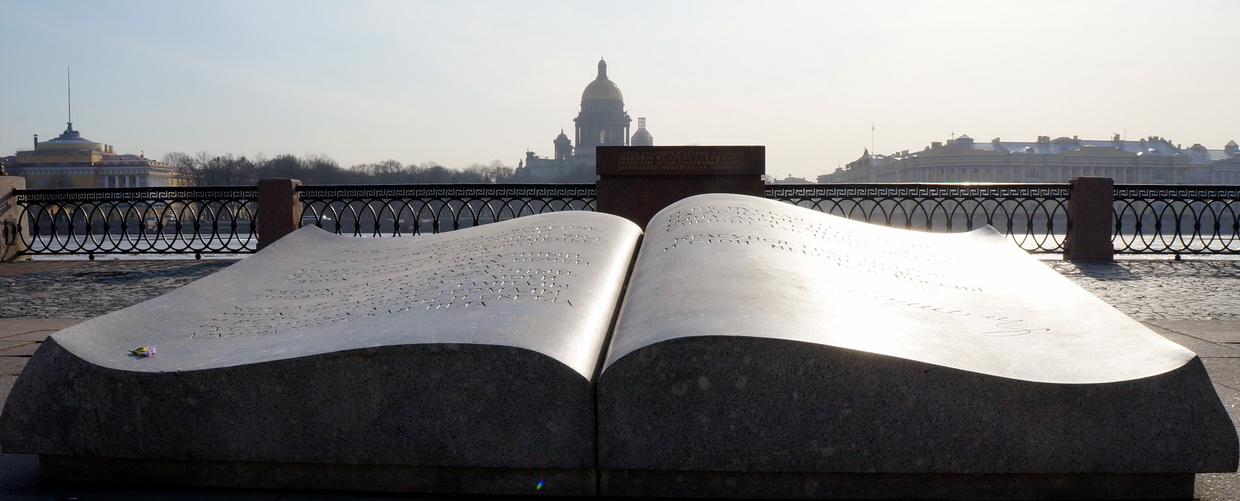
Summary of the Report of the Human Rights Ombudsman for Saint Petersburg on the human rights situation in Saint Petersburg in 2014
Introduction
The annual report of the Human Rights Ombudsman for Saint Petersburg (hereinafter -the Ombudsman) has been prepared according to the Law of Saint Petersburg "On the Human Rights Ombudsman for Saint Petersburg". This report was presented to the Legislative Assembly of Saint Petersburg on 25 March 2015.
The report outlines current human rights issues in Saint Petersburg, includes information about the activities of the Ombudsman and his Office aimed at redressing human rights violations, bringing legislation in line with human rights standards, and improving law enforcement and administrative procedures.
The report is based on analysis of information received from state authorities, non-governmental organizations (hereafter – NGOs), mass media publications as well as field inspections. However, like in the past years, individual complaints remain at the core of the Ombudsman’s activity.
Complaints brought to the Ombudsman in 2014
- Written complaints: 1812
- Complaints brought at face-to-face meetings: 756
- Complaint brought at special meetings: 21
- Complaints brought through “hotlines”: 88
- Complaints brought to public assistants of the Ombudsman: 95
Compared with 2013, the number of written complaints increased by 7%. The number of complaints brought through the Ombudsman’s website, as well as by email, has almost doubled.
As in previous years, in 2014 the largest number of complaints concerned social and economic rights. In particular, 23,2% of written complaints were in relation to housing rights.
As before, a high proportion of complaints concerned activities of government agencies, particularly law enforcement authorities. 11,9% of complaints were directly related to the action of law enforcement authorities and the Prosecutor’s Office of Saint Petersburg. A positive trend is however visible by the decrease by one third of such complaints compared with 2013 (then as high as 18%).
Encouraging changes should also be noted with regard to the rights of persons with disabilities owing to an increased attention of the state authorities to these issues.
On the other hand, problems related to enjoyment of the right to free elections as well as to freedom of association became more serious.
In the past year, the development of socio-political situation in the country had an impact on the human rights situation in Saint Petersburg. Events occurred in Ukraine and their reflection in mass-media led to a rough polarization of opinions, increased hatred feelings, mutual intolerance and harassment between partisans of different opinions. It was not favourable to the raising of public awareness about supreme values of the rule of law and human rights and freedoms.
Systemic causes of human rights violations
There is an opinion that the main source of existing problems in society lays in deficiency of the law. Thus, the main way to solve these problems would be to pass new laws, in particular, those creating further bans and restrictions.
Undoubtedly, there are problems which resolution requires changes of legislation. However, the Ombudsman’s analysis shows that, in most cases, applicable law gives rather sufficient basis for human rights protection. Many confirmed cases of human rights violations are due to other systemic problems, which can be divided into three groups:
-
lack of a proper implementation of the law and ineffective control over activities of public officials, municipal and state agencies;
-
lack of information about activities of state and municipal agencies available to the public;
-
weak communication between state bodies and civil society, in addition to a neglect of civil initiatives.
In 2014, the abovementioned sources of human rights violations were observed in nearly every sphere related to human rights.
Right to housing
Implementation of the right to housing remains a very significant issue in Saint Petersburg. The most typical complaints in this area concern the improvement of living conditions through either provision of housing to benefit-entitled citizens or allocation of monetary benefits for acquisition of housing under special city programs (44,7% of all housing-related complaints).
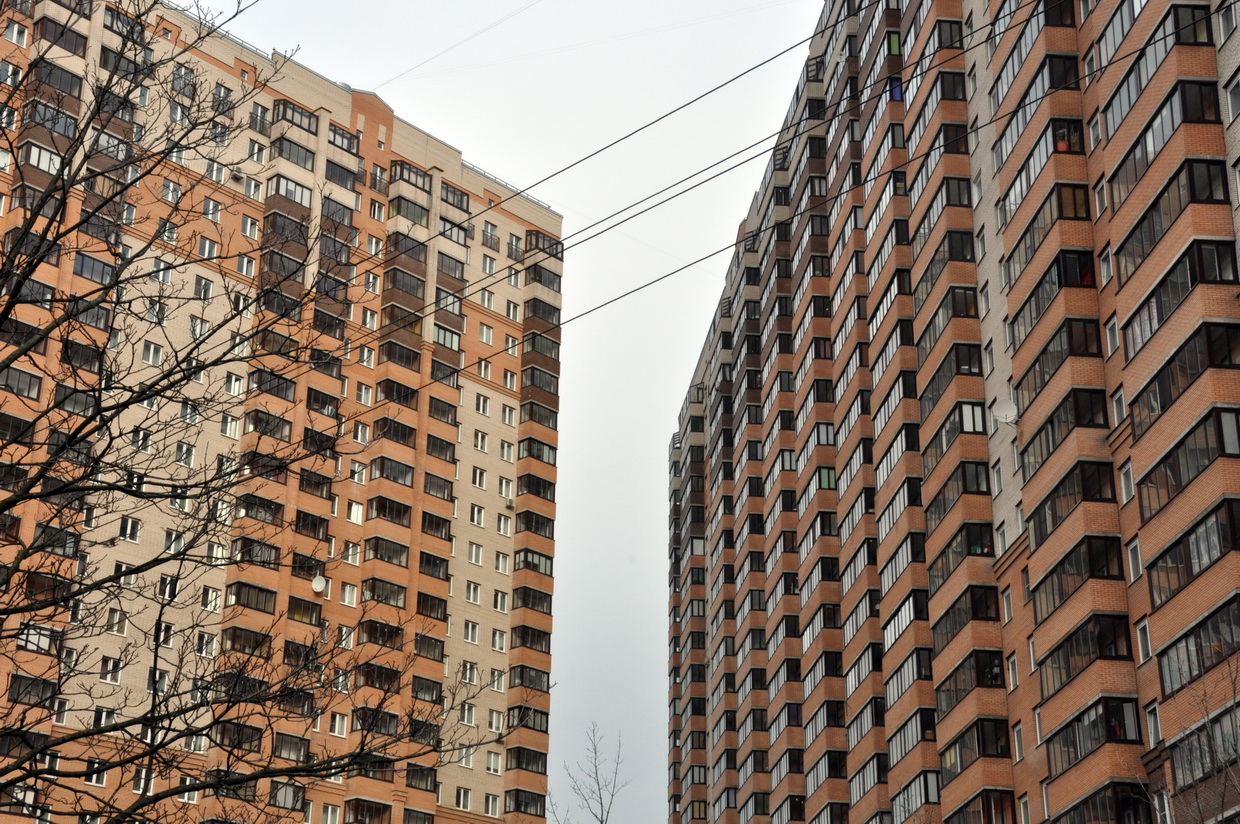
In 2014, the majority of confirmed cases of violation of housing rights had taken place not due to defaults of the law or the lack of budgetary funds but because of arbitrary interpretation by the executives of housing legislation, notably, of the Housing Code of the Russian Federation. These violations were confirmed by the Prosecutor’s Office of Saint Petersburg.
Most of the time, violations had occurred in the course of assessment of the actual housing situation of a family in order to determine whether its members are entitled to improving of their housing conditions. In a number of cases, executive bodies in charge took ill-founded decisions resulted in the rejection of registration of these persons as benefit-entitled on the ground that their current accommodation exceeded the quota of square meters per person allowing a citizen to be eligible for social housing.
Such violations are particularly critical when it comes to the provision of housing to people having priority due to suffering from heavy forms of chronic diseases[1] (in accordance with article 51 of the Housing Code).
In the Ombudsman’s view, in order to prevent further violations of this kind, the Housing Committee for Saint-Petersburg should elaborate guidance for city district administrations excluding arbitrary interpretation of housing legislation.
Right to life, liberty, personal security and dignity
A second largest number of complaints to the Ombudsman concern the right to liberty, personal security and dignity.
The Ombudsman regularly receives complaints on illegal behaviour of the police. In 2014, 32 criminal cases were opened on suspicion of crimes allegedly committed by police officers, including 13 cases under Article 286 § 3 of the Criminal Code of the Russian Federation (abuse of power committed with the use of force or threat of the use of force, with the use of arms or other means, or resulting in grave injuries).
As in 2013, many complaints concerned the refusal to open a criminal investigation into allegations of ill-treatment by police officers.
The Ombudsman pays a particular attention to detention facilities. In 2014, the Ombudsman received 134 complaints from persons detained in facilities of the Federal Penitentiary Service of Russia for Saint Petersburg and the Leningrad Region, some of them related to conditions of detention.
Timely communication of prisoners’ complaints to the body in charge and protection of their confidential character are two of the most important safeguards ensuring respect of the rights of this category of people. However, in 2014, administrations of remand detention centres (hereafter – SIZOs) N°1 and N°6 on several occasions delayed the communication of prisoners’ complaints to the Ombudsman.
In 2014, most of the SIZOs of Saint Petersburg were regularly overcrowded. For example, in SIZO N°1 (also called “Kresty”), which is designed for 1768 individuals, on average 2170 individuals were being detained, and on 1 January 2015 it accommodated as many as 2 295 individuals. SIZO N°4 was all year-round overcrowded by 4% to 27%.
It appears that overcrowding problem could be partly resolved by a broader use by the courts of alternative to pre-trial detention measures of restriction, such as release on bail. During the first six months of 2014, first-instance district courts allowed pre-trial detention in 2 209 out of 2 466 cases (89,6%). House arrest was ordered in 9 cases, and bail – in 5 cases only.
Consequently, the Ombudsman urged the President of Saint Petersburg City Court to initiate a discussion among judges on the use of pre-trial detention in the light of the case-law of the European Court of Human Rights and the Decision N°41 of 19 December 2013 of the Plenum of the Supreme Court of the Russian Federation.
Rights of conscripts and servicemen
In 2014, an encouraging decrease of complaints to the Ombudsman from conscripts and servicemen proved to be constant, as 76 complaints were recorded against 79 in 2013. In 2014, the Committee for Justice, Legal Order and Security in Saint-Petersburg recorded 166 complaints from conscripts and servicemen, which is by 40% lower than in 2013 (276).
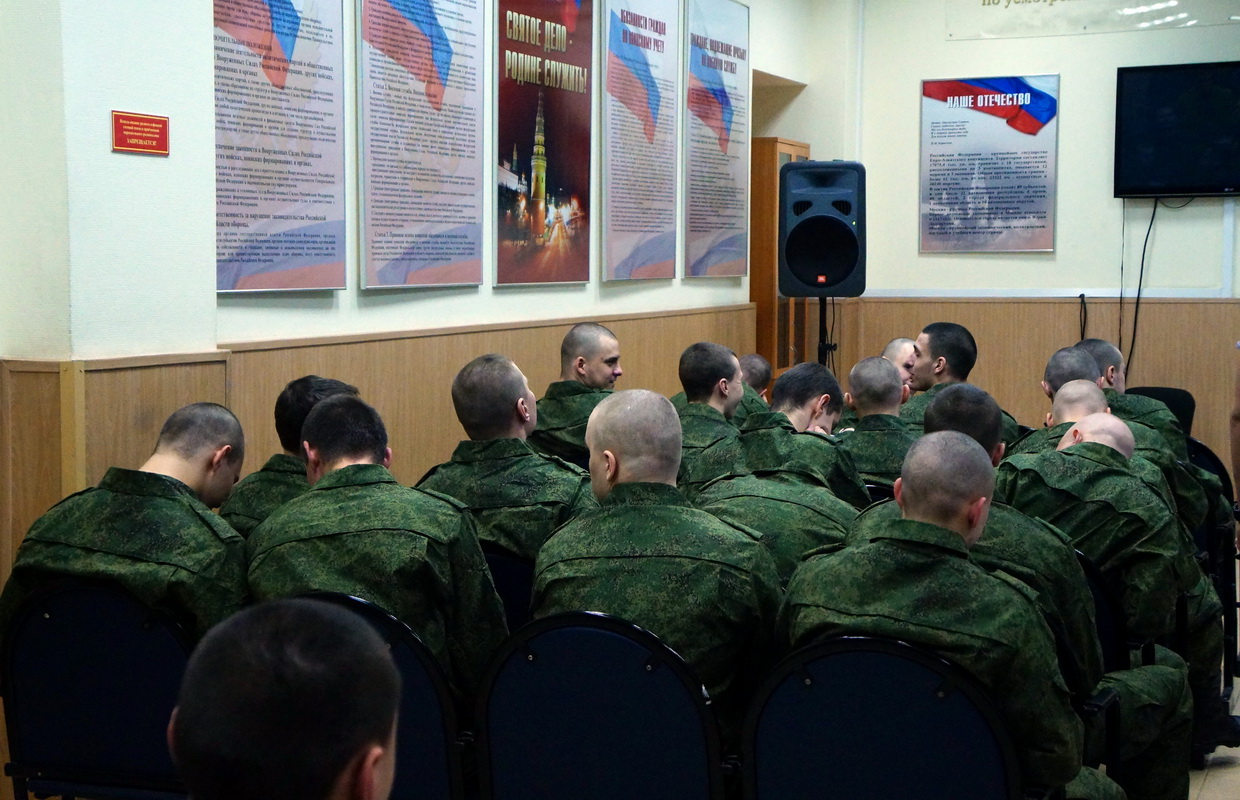
To a large extent it is a result of the cooperation between the Ombudsman and the abovementioned Committee, the Recruitment Office for Saint Petersburg, the civil and military Prosecutor’s Office of Saint Petersburg and NGOs specialized in the defence of the conscripts’ rights. The Ombudsman is a member of the army conscription commission for Saint Petersburg. Staff members of his Office are also members of army conscription commissions for Vyborgskiy, Krasnoselskiy, Nevskiy, and Frunzenskiy districts of Saint Petersburg, as a significant number of complaints brought in the previous year concerned decisions of these commissions.
Despite such a positive evolution, the Ombudsman received a number of complaints concerning the rights of conscripts and servicemen on the following issues:
- problems related to the participation of conscripts and their representatives in procedures in relation to the call for national service;
- problems concerning the conscripts’ right of access to their personal file;
- problems concerning the conscripts’ right to undergo an accurate and unbiased medical examination prior to the call;
- problems concerning delays in obtaining military documents by persons unfit to serve;
- cases of hazing and bullying in the army;
- problems concerning a certain category of conscripts who were prevented from performing their constitutional duty to serve (though they expressed their willingness to).
Violations of the conscripts’ rights occurred during the 2014 campaign for national service call were due not to defects of the law but to improper implementation practices.
Right to medical assistance
The Ombudsman is very concerned by the situation in the sphere of medical assistance to oncology patients in Saint Petersburg. In oncology, a timely diagnostic is crucial not only for preservation of health, but for saving of life. However, in Saint Petersburg 40% of these diseases are diagnosed at stage 3 or 4. In 2014, during field inspections of oncological institutions it was found out that medical equipment for diagnostics and therapy of oncological diseases was periodically out of service.
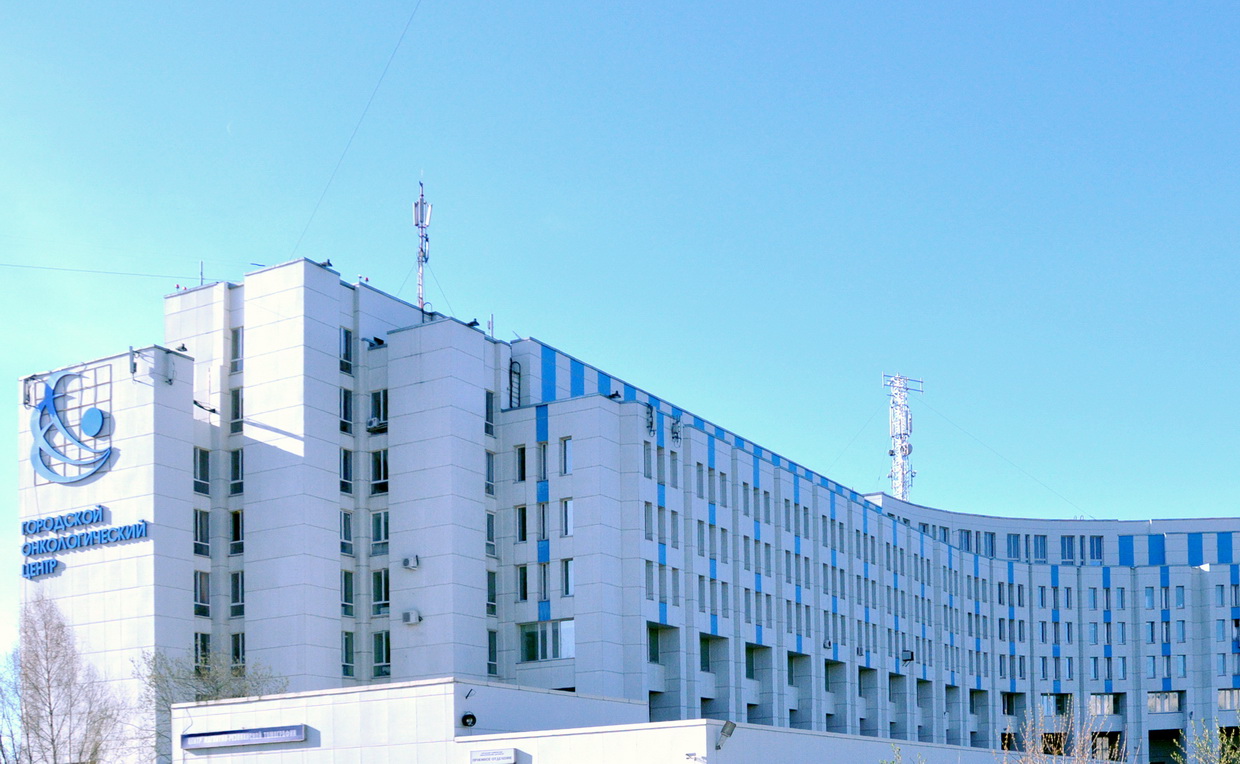
Problems related to timely providing drugs to benefit-entitled citizens, in particular at the beginning of the year, are still acute. This indicates a need to rethink the current procedure for providing citizens with discounted drugs and medical items.
Environmental rights
Saint Petersburg faces a number of environmental problems that require urgent solutions. The most critical issue is the inefficient recycling of compact domestic and hazardous wastes. InSaint Petersburg there is the largest in the North-western Federal District of Russia landfill of industrial hazardous waste "Krasniy Bor", where more than 1,5 million tons of waste is kept. In December 2014, the landfill got back a previously revoked license to perform decontamination and disposal of hazardous waste. The company's website does not contain information required by the law, in particular, about technological and environmental control. Meanwhile, experts raise alarm about the high risk of a leak of highly toxic chemical liquid stored on the site, as well as of illegal discharge of wastes in Saint Petersburg’s water courses.
Years of delay on resolving this question and other environmental issues are due to non-observance and the lack of enforcement of the existing legislation, lack of access to full and reliable information about the environment and to a weak cross-sector and cross-agency cooperation.
In this regard, in 2014 the Ombudsman focused on cross-sector and cross-agency collaboration in the sphere of protection of environmental rights. As a result, on 18 December 2014 the Ombudsman held a conference which gathered representatives of more than 20 state bodies, 15 NGOs specialized in environmental issues, 10 institutions performing scientific research and educational missions.
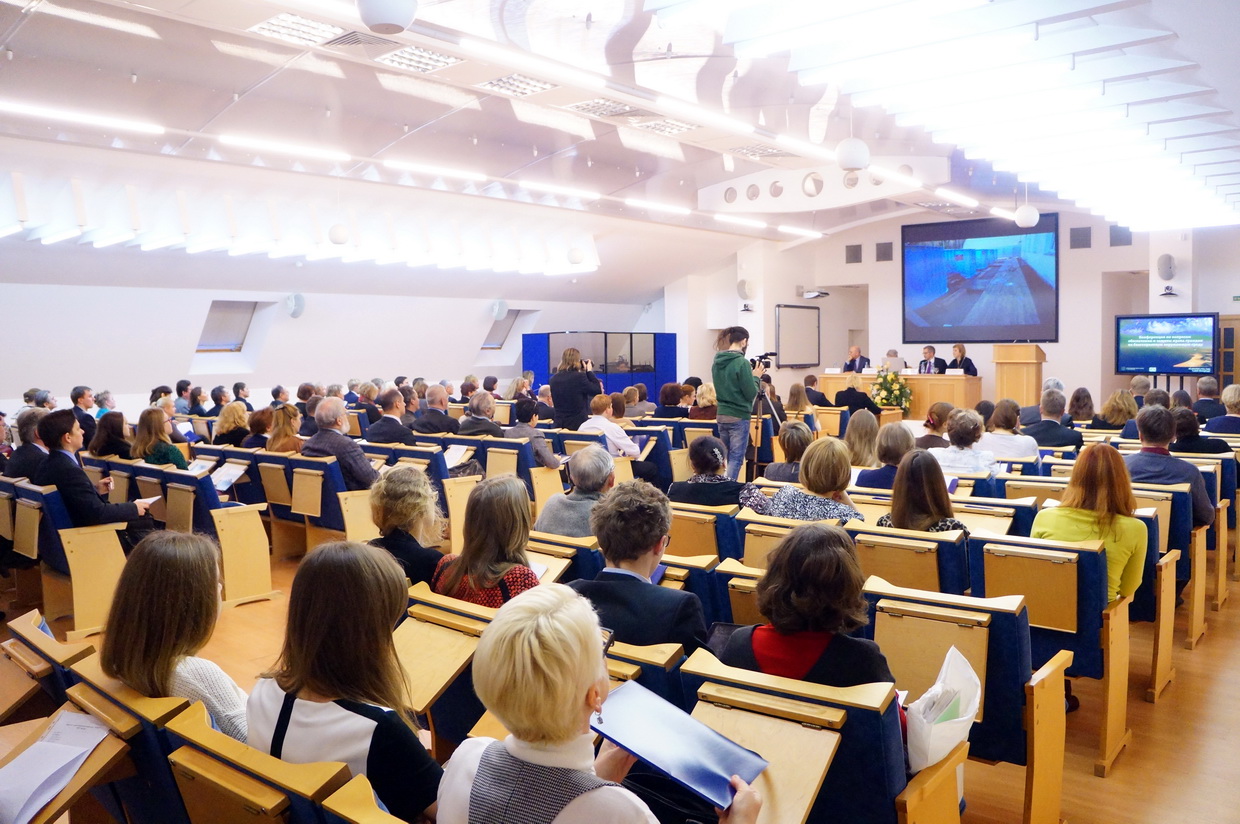
Participants discussed issues of air and water pollution and waste disposal. A separate session was devoted to environmental education.
Equality and non-discrimination
Rights of persons with disabilities
In 2014, for the first time in Saint-Petersburg the Ombudsman initiated large field inspections aiming at controlling the implementation of the city program called “Creation of a friendly environment for persons with disabilities”. Inspections were carried out with the participation of representatives of civil society organisations and persons with disabilities. Inspections took place from May to October 2014 and consisted in the assessment of randomly chosen 104 public places, including social, health-care, cultural, educational and sport institutions.
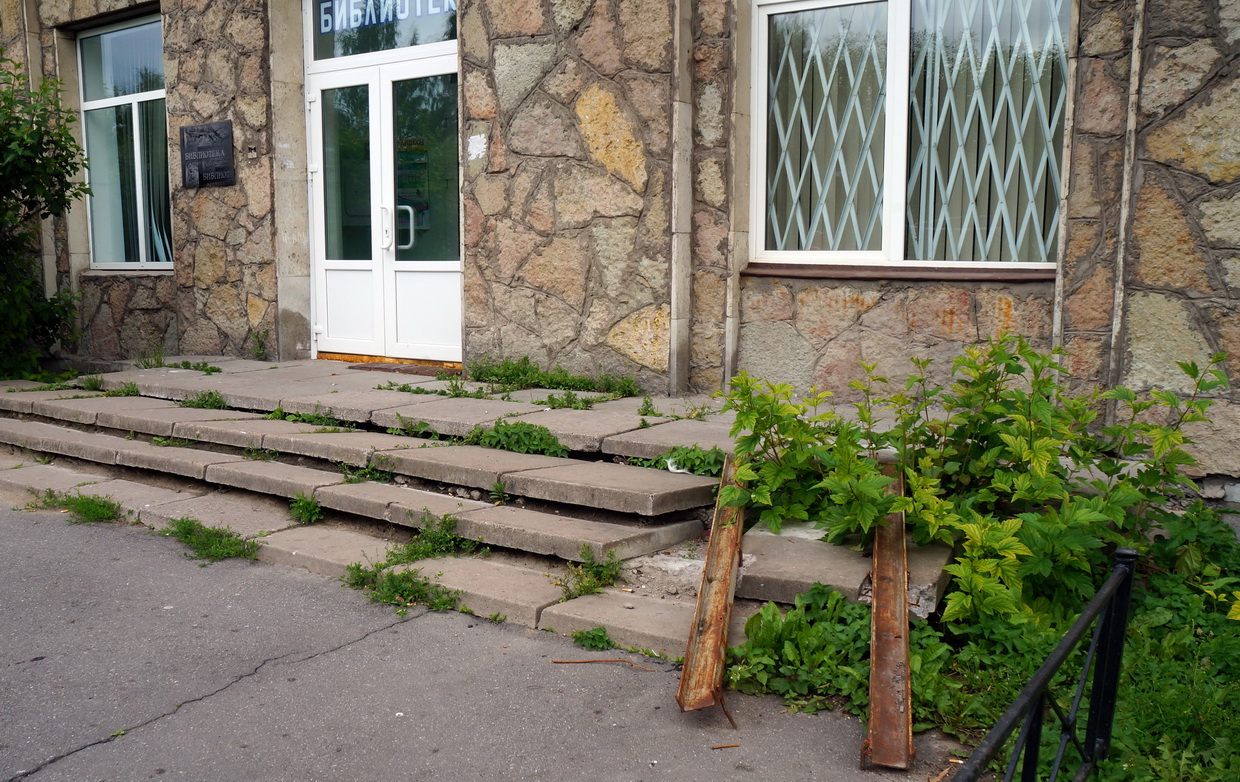
Despite the conclusions of the executives of the program, according to which a number of public places were 100% accessible for persons with disabilities, the results of the inspections revealed the opposite. A formal approach consisting in implementation of the program without taking into account real needs of persons with disabilities led to a “sham accessibility”.

In June 2014 the results of the first stage of inspections were presented to the Governor of Saint Petersburg. After this presentation positive tendencies in the implementation of the program were observed.
In the course of examining individual complaints, the Ombudsman addresses not only individual problems. Also, through his mediation, he tries to eliminate structural causes of human rights violations. For example, a review of a complaint about the lack of access to a so-called “social taxi” for persons with disabilities revealed that, at the beginning of 2014, only two out of 94 transport companies offering social taxi services possessed an equipped car for wheelchairs.
Upon the Ombudsman’s proposal, the Committee for Social Policy and the Committee for Transport for Saint Petersburg introduced new requirements for transport companies to be eligible to provide social taxi services. One of the new requirements consists in an obligation for the company to possess at least one car fitted for wheelchair transport. As a result, from 1 January 2015, 53 cars fitted for wheelchairs are available for persons with disabilities.
The Ombudsman’s 2013 Annual Report outlined violations of the rights of persons with mobility impairments in accessing pharmacies dedicated to the provision of medicines for benefit-entitled citizens (hereinafter – social pharmacies). Field inspections of 32 out of 42 social pharmacies had then shown that only one of them was accessible for persons with motor disabilities.
The conclusions of these inspections were transmitted to the Governor of Saint Petersburg. Consequently, in 2014, tender documentation for contracts’ conclusion with the city authorities included requirements to ensure friendly access for motor-disabled people and other categories of people with disabilities (ramps, handrails, and call buttons for staff intervention).
Rights of people living in psychoneurological state care institutions
Persons with mental disabilities constitute a special group of disabled persons. For these persons it is often difficult to express their will and needs. Therefore, enjoyment of human rights turns out problematic for them.
A large proportion of people with mental disabilities live in state social institutions – foster homes for children and psychoneurological care institutions for adults. 70% of children living in foster homes have parents who are not deprived of their parental rights. They were obliged to place their child at a foster home due to the absence of adequate social support. Reaching 18 years-old, these children are usually transferred to psychoneurological institutions for adults, in which they live their whole life.
In 2014, inspections carried out in several psychoneurological care institutions revealed the following human rights problems:
- the institutions’ conflict of interest between their role as a provider of social services and their role as a tutor of legally incapable individuals;
- a total ban on smoking in these institutions;
- unreasonably restricted hours for visits by relatives and friends, in obvious violation of law provisions;
- a failure to ensure unimpeded access of representatives of civil society organizations and volunteers into these institutions.
Many problems have their source in the actual closed nature of these institutions and the absence of effective control by civil society.
Changing this situation depends on a reform of tutorship and curatorship for people living in psychoneurological care institutions. Another objective consists in a gradual transition from big institutions to another form of social support to this category of people allowing them to be fully involved in society, in line with the requirements of the Convention on the rights of persons with disabilities.
Discrimination of aliens
Xenophobia and nationalism remain issues of grave concern for Saint Petersburg. In 2014, in a number of cases xenophobia took violent forms. 31 persons were victims of attacks of radical nationalists; two of these persons were killed. Law-enforcement authorities opened 10 criminal investigations into such attacks. However, in general, the reaction of the society is not proportional to the level of violence and insecurity caused by nationalistic threats.
A survey carried out by a centre of sociology“Megapolis” in August 2014 shows that the level of unmotivated xenophobia is high. According to the results of the survey, non-Russian population of the city, in particular, people originating from Central Asia and North Caucasus are the main source of social discontent for 50% of inhabitants. The survey also shows that migration servicesand foreign workers themselves are perceived to be responsible for inter-ethnic problems. Public pays far less attention to discrimination towards ethnic minorities and foreign nationals.
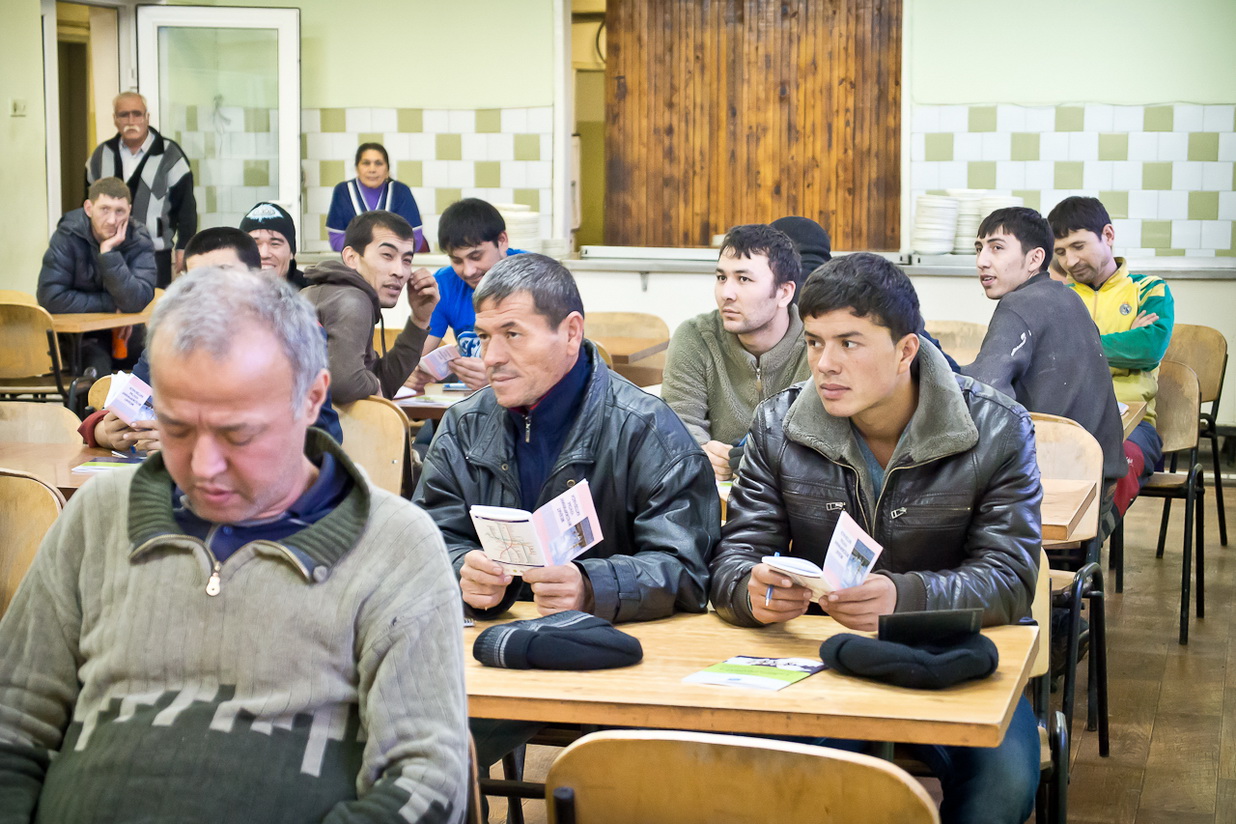
In his 2013 Annual Report the Ombudsman outlined problems related to conditions and length of detention of foreign nationals waiting for expulsion from the Russian territory in an aliens centre of the Directorate of the Ministry of Internal Affairs of Russia for Saint Petersburg and the Leningrad Region situated in Krasnoye Selo (hereinafter – the Centre). From 1 January 2014 the Centre was put under the authority of the Directorate of the Federal Migration Service of Russia for Saint Petersburg and the Leningrad Region. A governmental act on conditions of detention in the Centre was passed. However, many of previously mentioned problems remain unresolved.
One of the fundamental problems remains overcrowding of the Centre. On 28 February 2014, the Centre accommodated 400 individuals, and on 1 September 2014 – no less than 373, whereas the Centre is designed to accommodate a maximum of 336 persons.
Another issue is the determination of legal status of aliens whose expulsion is impossible.[2] Legislation in force does not provide for their legalization. Therefore, following their release from the Centre, they remain undocumented aliens and repeatedly run the risk to be arrested for breach of residence rules.
In 2014, the Ombudsman received information about difficulties that occur in the process of application for asylum by persons detained in the Centre. Representatives of the migration service carried out interviews with asylum seekers in the Centre only three months or more after having received an application for asylum.
A positive tendency was a change of the courts’ jurisprudence regarding expulsions of foreign nationals to Syria. First, the Leningradskiy Regional Court and the Saint Petersburg City Court and then district courts have started to acknowledge that expulsion to Syria is impossible due to the on-going armed conflict and violence in this country.
Gender discrimination
One of the most widespread forms of discrimination remains discrimination on the ground of gender. Most of the time, it occurs in labour relations. In 2014, 217 pregnant women and women with children under three years old sought legal assistance at an NGO “Peterburgskaya Egida”. 22 of them stated that they had been forced to quit or that they had been unlawfully fired. Three of them complained about the refusal of their employer to transfer them to less difficult job. Two of them complained about the refusal to get annual paid leave and days-off for required medical check-ups.
Discrimination of LGBT
In 2014, there was a continuing escalation of aggressive attitudes targeting people with “non-traditional sexual orientation”.
In 2014, 36 aggressions against LGBT were reported, 30 of which occurred at public events. Attempts of dismissal of LGBT employees of educational institutions had also taken place. Educational institutions, parents and even pupils received anonymous letters about alleged immoral behaviour of targeted teachers. To the credit of educational institutions, most of these cases had not serious consequences. However, in one case it led to the dismissal of a teacher. A lawsuit aiming at redressing her labour rights is pending before a court.
In 2014, cases of organized violent obstruction by radical groups to LGBT public events were recorded. These violent actions organized by self-proclaimed “guardians of the order” must be stopped by law-enforcement authorities.
In order to effectively prevent xenophobia, the Office of the Prosecutor of Saint Petersburg and the Directorate of the Ministry of Internal Affairs of Russia for Saint Petersburg and the Leningrad Region should take additional measures aiming at reinforced control and supervision over enforcement of the law. They must also take measures in order to arrest and bring to justice individuals responsible for discrimination and violation of the principles of equality.
The Government of Saint Petersburg should consider organizing training for employees of state bodies and NGOs aiming at improving their skills in the sphere of prevention of inter-ethnic tension.
Fundamental civil rights as a basis for implementation of social rights
Freedom of association
In 2014, in Saint Petersburg the following problems were identified in the sphere of implementation of the right to freedom of association:
- deficiencies in state mechanisms to support NGOs;
- increasing number of inspections of NGOs by state bodies of control and supervision;
- including of a number of NGOs in the register of organisations carrying out functions of a “foreign agent”.
Over the past two years, one of the main problems faced by NGOs has been frequent and duplicative inspections led by control and supervisory bodies.
According to NGOs, the cost of execution of inspectors’ requests in some cases may exceed 300 thousand roubles per year. For many NGOs, this is a very significant amount. It should also be noted that, according to the law, administrative expenses of charities may not exceed 20% of their spending for financial year.[3]
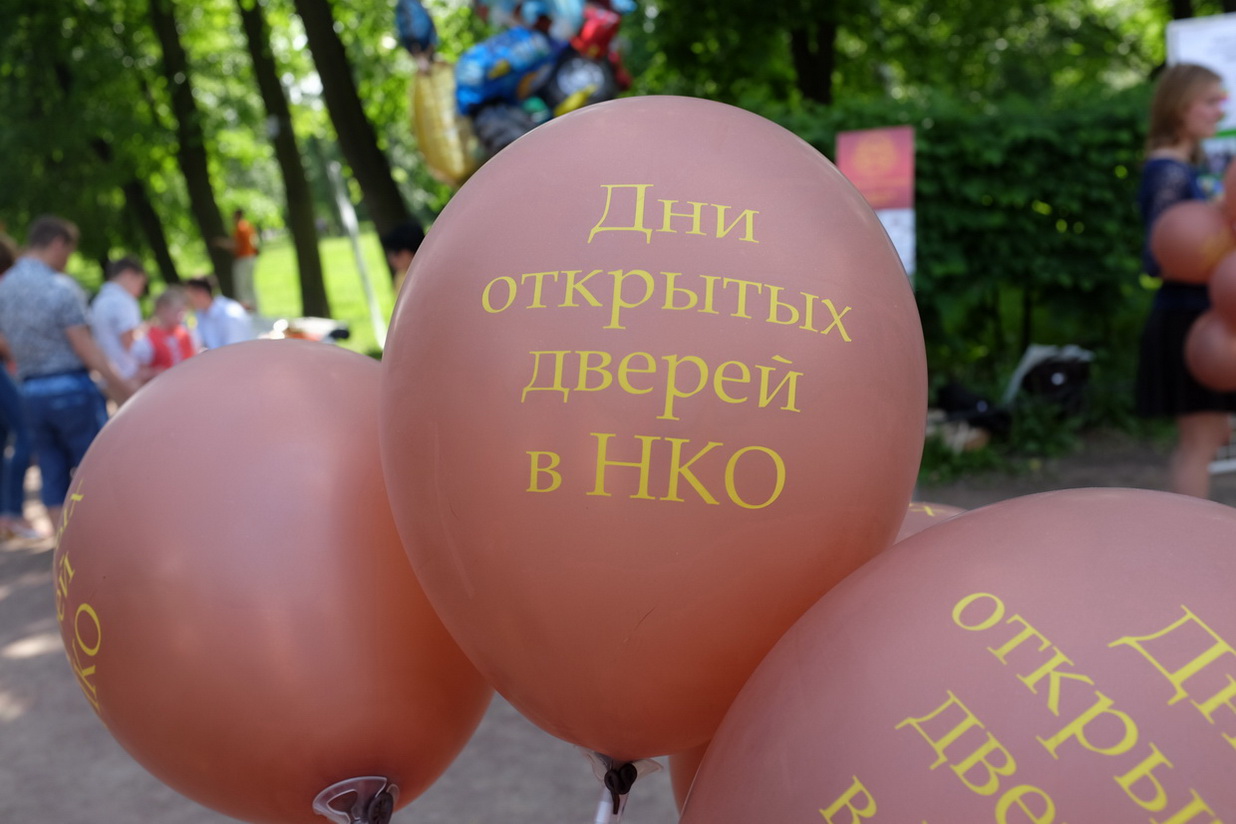
In 2014, the Prosecutor’s Office of Saint Petersburg carried out more than 150 inspections of NGOs, and the Directorate of the Ministry of Justice of Russia for Saint Petersburg – 66 planned and 13 unscheduled inspections.
NGOs had serious problems in relation with implementation of the Federal Laws of 12 January 1996 No 7-FZ «On non-commercial organisations» (hereinafter – the Law on NGOs) and of 19 May 1995 No 82-FZ «On associations».
In 2014, the Ministry of Justice of Russia included 6 NGOs in the register of organisations carrying out functions of a foreign agent: “Freedom of Information Foundation”, “Soldiers’ Mothers of Saint-Petersburg”, “Institute for Regional Press”, “Human Rights Resource Center”, “Citizens’ Watch”, and “Women Voters’ League”. After their inclusion in the list of “foreign agents”, four NGOs decided to put an end to their activities and went into liquidation. Among them – “Anti-Discrimination Centre “Memorial”, LGBT organization “Coming Out”, LGBT International Film Festival “Side by Side”, and “Women Voters’ League”. In January 2015, “Freedom of Information Foundation” also stopped its activities.
The main problem of implementation of provisions of the Law on NGOs remains the lack of definition of the term “political activity” which prevents a clear understanding of the type of activities that can be legally characterised as “political”.
For example, “Freedom of Information Foundation” was included in the register of “foreign agents” on account of promoting information transparency of state bodies’ websites. This activity was recognized as political. The Prosecutor’s Office of Saint Petersburg also declared as political activity collaboration of “Soldiers’ Mothers of St. Petersburg” with the Ombudsman.
It appears that in order to guarantee a full enjoyment of the constitutional right to freedom of association not only changes in implementation of the law are required. The Law on NGOs itself should be amended.
Freedom of assembly
In 2014, more than 3 000 public events had taken place in Saint Petersburg (which is 50% more than in 2013). The Ombudsman and staff members of his Office attended 32 public events in order to monitor respect of rights and freedoms. The Ombudsman also received complaints from individuals and NGOs about violation of the freedom of assembly.
The following repetitive problems were indentified:
- Numerous and not always well-founded disapprovals by the local authorities of location and/or time of public events;
- Ban on holding public events near buildings occupied by state authorities, educational institutions and health care facilities;
- Deficiencies of legislation on the use of dedicated locations for holding of public events;
- Illegal arrests of participants of public events;
- Obstacles caused to participation in public events.
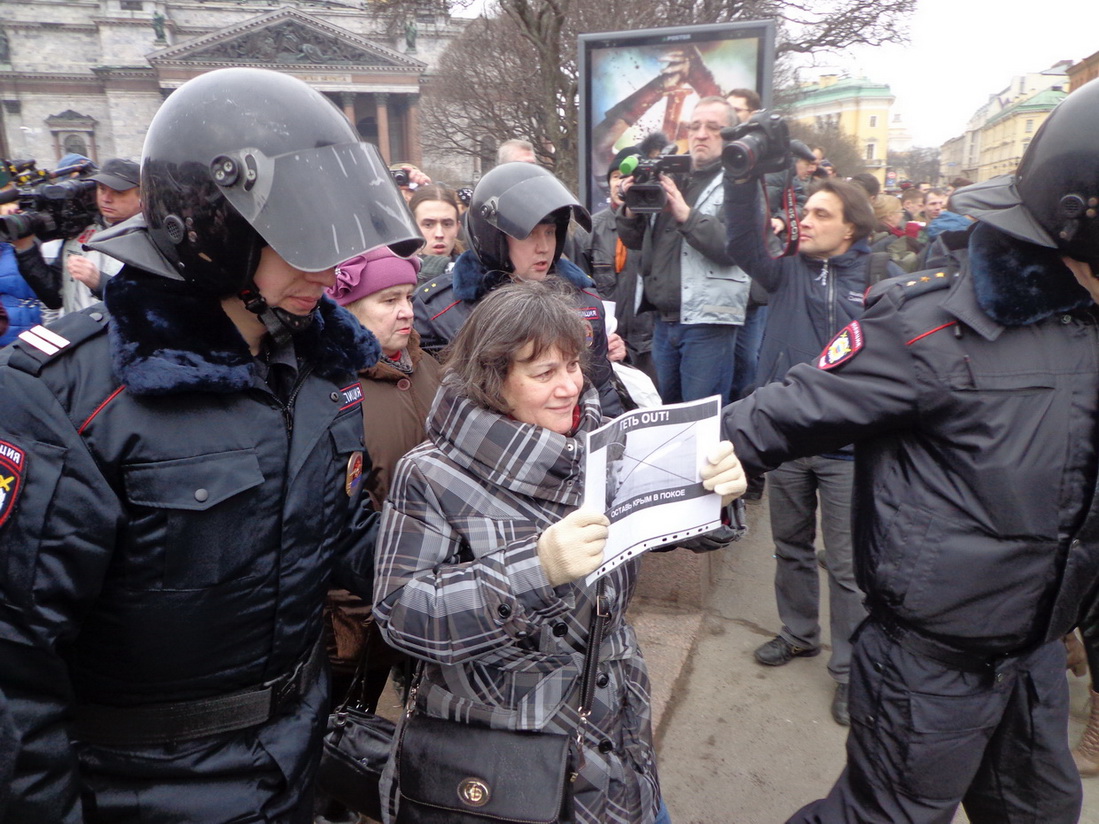
In order to ensure the right to freedom of peaceful assembly and the respect of the rights and freedoms of participants during public events, in 2014 the Ombudsman actively cooperated with state authorities, including the Committee for Justice, Legal Order and Security for Saint Petersburg and the Directorate of the Ministry of Internal Affairs of Russia for Saint Petersburg and the Leningrad Region.
Cases of unfounded refusals to hold public events raise a particular concern. The current procedure of approval by the authorities of notifications about public events may give rise to manipulations. For example, in some cases, the authorities disapproved proposed location for a public event and, as alternative, suggested another location situated at a considerable distance from the initially proposed location, unsuited for the intended goal of the event.
Often, the reason of disapproval was that another public event (including cultural and sportive mass events) was to be held at the same location and time. Yet, mass events the authorities referred to often did not take place.
Legislation in force provides for dedicated locations for public events (so-called “Hyde parks”). The organization of public events in dedicated locations has its own advantages. Firstly, notification to the authorities about such events can be made 4 days in advance (against 10 days for public events out of dedicated locations). This gives to the citizens the possibility to quickly react to events they deem important. Secondly, the use of dedicated locations does not require approval by the authorities. The only obstacle to holding a public event in these “Hyde parks” can be an earlier notification about another public event at the same time and place.
In 2014, none notification was made about the intention to hold a public event at four out of five dedicated locations (all four are situated far from the city centre). The only dedicated location that was used is the Field of Mars located in the city centre (15 public events were held there).
It appears that these locations remain unsolicited because they do not meet the requirements for dedicated places set out by the law, as interpreted by the Constitutional Court of the Russian Federation (notably, transport accessibility and the possibility to achieve goals of public events).
In this regard, the Ombudsman maintains his previous recommendations about the need to amend Saint Petersburg legislation.
Staff members of the Ombudsman’s Office observed that during the second half of 2014, the number of illegal arrests of participants of approved public events had significantly decreased. The number of arrests carried out during unapproved public events also decreased in cases where the holding of such events did not threaten public security, life and health of the participants and other people.
However, increasing number of cases of obstruction to public events caused by individuals with opposite points of view is of a particular concern. One of the reasons for this increase is the failure to bring to justice those responsible for obstruction.
On 17 May 2014, a meeting calling for “A tolerant behaviour of society towards LGBT community”was scheduled to be held in the dedicated location on the Field of Mars. Fearing obstruction to the event, the organizers asked for the Ombudsman’s assistance.
Thanks to measures taken by the police (which took into account the Ombudsman’s recommendations) the meeting was conducted without serious violation of legal order. The police promptly coordinated their action with the organizers and effectively prevented violations. This example shows that even in situations of confrontation of opposite points of view, effective implementation of the right to freedom of assembly is possible.
Right to free elections
According to information from the Central Electoral Commission of the Russian Federation (hereinafter – the Central Electoral Commission), the highest number of complaints about violations occurred on the common day of elections in Russia, 14 September 2014, was recorded in Saint Petersburg (342 out of 1895 complains).
As a result of a high number of violations, including violations confirmed by judicial decisions and decisions of the Central Electoral Commission, there was a further loss of people’s trust in the very institution of elections and in the possibility to enjoy the constitutional right to free elections.
As follows from the analysis of complains, one of the endemic sources of violations is the non-execution of the law providing for mechanisms of access of people to information on the activity of electoral commissions and their decisions. As the 2014 electoral campaign showed, neither territorial nor local electoral commissions provide even basic necessary information about their location and schedule. In most cases, decisions of these commissions which should be published are not accessible for the public.
Even the decision of the Saint-Petersburg Electoral Commission of 29 July 2014 No 69-10 “On measures of implementation of electoral rights of persons with disabilities during the elections of the Governor of Saint Petersburg to be held on 14 September 2014” was not published on the Commission’s website. This confirms the trend identified in 2013 consisting in a selective publication of decisions.
The lack of transparency of electoral commissions for civil society’s scrutiny is not limited to these examples. Unfortunately, the president of the Saint Petersburg Electoral Commission repeatedly refused to provide to the Ombudsman requested information. The situation did not change even after the Prosecutor’s Office of Saint Petersburg indicated that the Saint Petersburg Electoral Commission has an obligation to provide information to the Ombudsman.
This is a unique case of clear obstruction to the Ombudsman’s activities. It is to be hoped that by the next election campaigns the practice of the organization of electoral process in Saint Petersburg will change and that electoral rights will be respected.
***
Despite continuing problems of implementation of social, economic and civil rights in 2014, there has been an active development of cooperation between the Ombudsman and the state bodies and NGOs aiming at tackling these issues. “Building bridges”, facilitating a dialogue, finding mutual understanding between citizens and officials, between civil society and the State is a particularly relevant mission of the Human Rights Ombudsman as an independent public human rights institution.
[1]According to the Act of the Russian Government of 16 June 2006 N°378 “On the list of heavy forms of chronic diseases which require separate housing”.
[2] For example, due to the fact that no State recognizes the alien as its national.
[3] Article 16 §§ 3, 4 of the Federal Law of 11 August 1995 No 135-FZ “On charity and charity organizations”.










